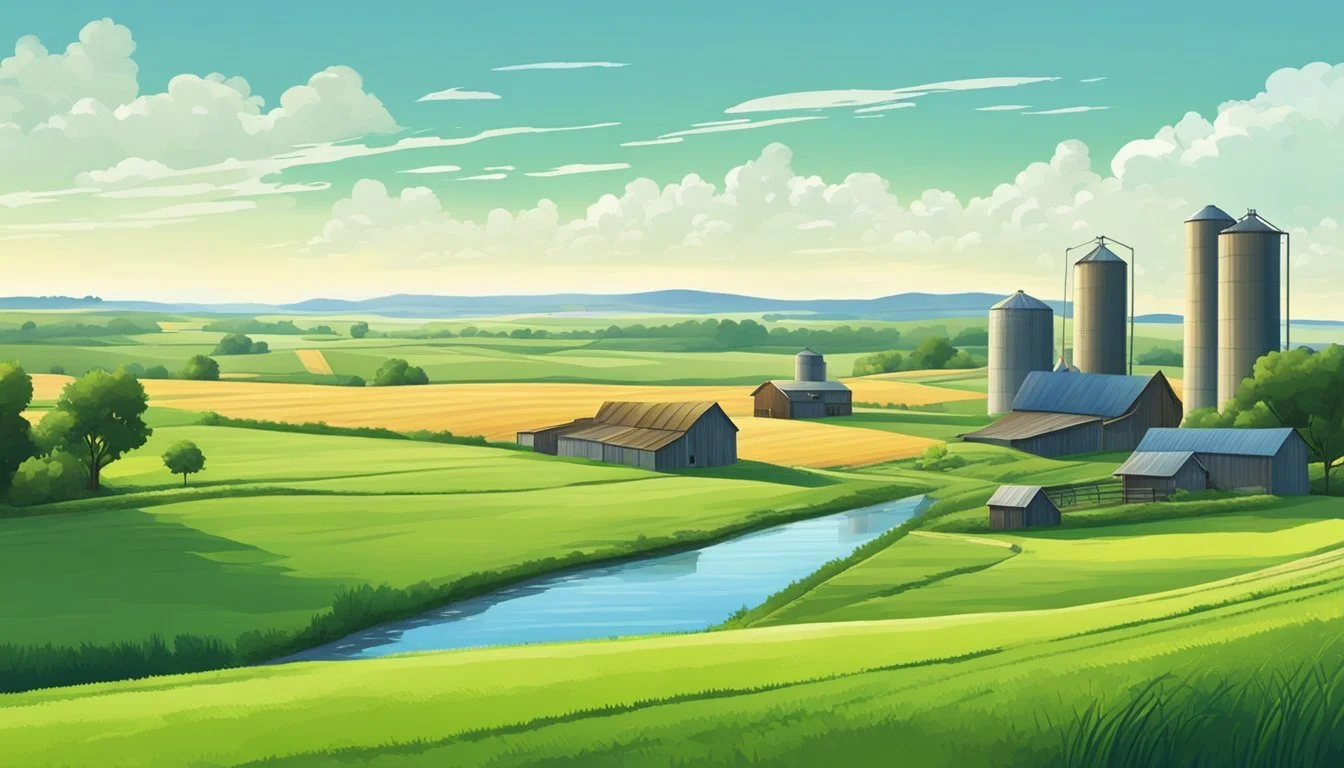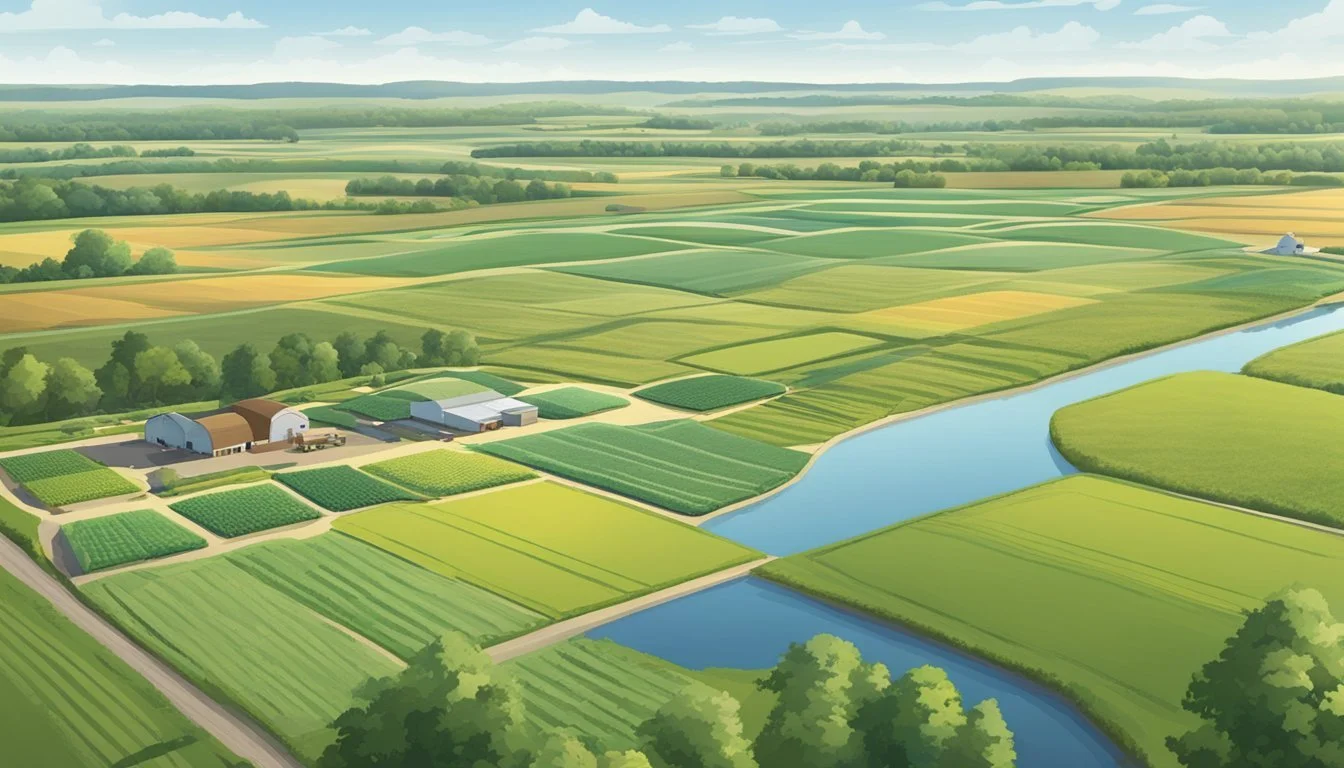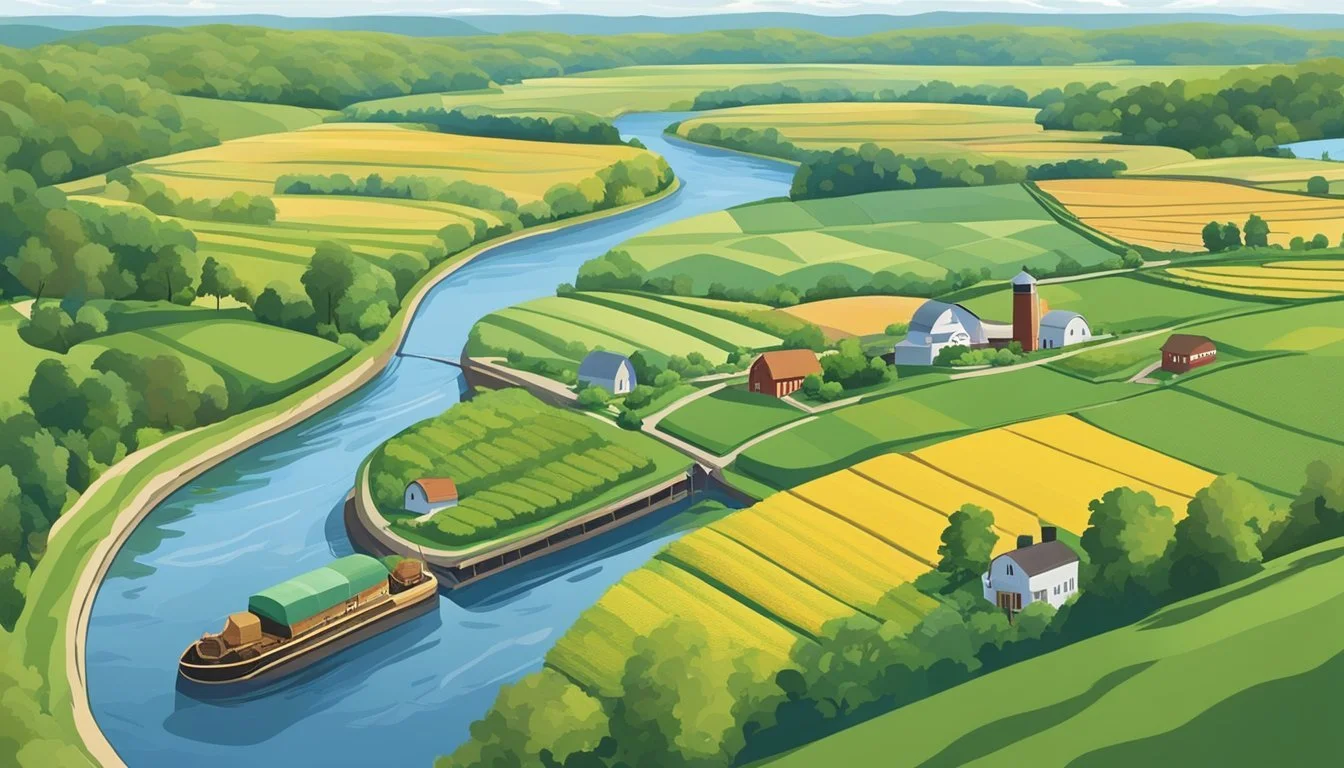Farming Communities in Mississippi
Evolution and Modern Practices
Mississippi's farming communities are a cornerstone of the state's heritage and economy. Spread across fertile lands, these communities are home to a variety of agricultural endeavors, from traditional crops like cotton and soybeans to livestock and dairy farming. With over 100,000 acres of farmland available, Mississippi remains a vibrant hub for agricultural innovation and sustainability.
In areas like Sardis, farms such as the picturesque Ray Farm offer not just agriculture but a lifestyle, with expansive properties featuring lakes, barns, and modern homes. These communities sustain themselves through shared knowledge and resources, fostering a strong sense of camaraderie among farmers. The presence of urban farming initiatives, such as Foot Print Farms in Jackson, showcases the state's commitment to integrating modern farming techniques with traditional practices.
Mississippi's combination of historical legacy and contemporary agricultural practices makes its farming communities both unique and resilient. Whether it’s the sprawling countryside farms or the innovative urban plots, Mississippi offers a dynamic environment for those committed to agriculture and community. Farmers here not only contribute significantly to the state's economy but also enrich its social and cultural fabric.
History of Agriculture in Mississippi
The history of agriculture in Mississippi is deeply intertwined with its economic, social, and cultural evolution. From the cotton plantation era to significant impacts during the Civil Rights Movement and contributions by institutions like Tougaloo College, each phase has shaped the state's agricultural landscape.
Cotton Plantation Era
The cotton plantation era established Mississippi as a leading cotton producer in the United States. This period began in the early 19th century and reached its peak before the Civil War. Large plantations dominated the landscape, heavily relying on enslaved labor to cultivate and harvest cotton.
Key Features:
Economic Dependence: Cotton was the primary cash crop, making up a significant portion of the state's economy.
Labor System: The exploitation of enslaved African Americans provided the manpower necessary for large-scale cotton production.
Land Use: Expansive plantations with hundreds of acres were commonplace, overshadowing smaller farms.
The impact of this era is still evident in the state’s agricultural practices and rural development patterns.
Civil Rights Movement Impact on Farming
The Civil Rights Movement of the 1960s brought substantial changes to farming communities in Mississippi. African American farmers, who had long faced discrimination and systemic barriers, began to see gradual improvements in access to resources and farming opportunities.
Key Impacts:
Land Ownership: Efforts were made to secure land ownership rights for African Americans, though challenges persisted.
Cooperative Farming: Black farmers banded together to form cooperatives, sharing resources and knowledge to improve productivity.
Federal Programs: Initiatives like the New Deal provided assistance, though access was often unequal.
The movement highlighted ongoing inequities and pushed for reforms that continue to influence agricultural policies today.
Tougaloo College's Role in Agriculture
Tougaloo College has played a significant role in advancing agricultural education and research in Mississippi. Founded in 1869, this historically Black college has been instrumental in empowering African American students and fostering agricultural innovation.
Key Contributions:
Educational Programs: Tougaloo offers courses and degrees focused on agricultural sciences, preparing students for careers in farming and agribusiness.
Research Initiatives: The college conducts research on sustainable farming practices, bridging traditional methods with modern technology.
Community Outreach: Programs aimed at local farming communities help disseminate knowledge and support grassroots agricultural development.
Tougaloo’s efforts have been vital in promoting sustainable agriculture and economic development in Mississippi's rural areas.
The Landscape of Mississippi Farming
Mississippi's farming landscape is diverse, featuring the fertile Delta region and extensive rural areas. These regions support different types of farming operations, from crop production to livestock management.
Delta Region and Agriculture
The Mississippi Delta is known for its fertile soil, making it a crucial area for agriculture. It stretches from the border of Tennessee down to Vicksburg, Mississippi. The rich, alluvial soil deposited by the Mississippi River supports a variety of crops, including cotton, soybeans, and corn. The region's flat topography enhances its suitability for mechanized farming operations.
Farmers in the Delta region often employ advanced agricultural techniques and equipment. This includes precision farming technologies that optimize planting, fertilization, and harvesting. The area is also notable for its large-scale farms, many of which are family-owned and have been operational for generations.
The economic contribution of the Delta's agricultural output is significant, providing both local employment and sizeable agricultural exports. Due to its importance, the Delta remains a central focus for agricultural research and development initiatives.
Rural Mississippi and Farming Operations
Rural areas outside the Delta also play a vital role in Mississippi's farming landscape. These regions are characterized by a combination of small family farms and medium-sized farming operations. Livestock farming, including cattle and poultry, is particularly prominent in these areas, alongside traditional crop cultivation.
Rural Mississippi benefits from diverse topography, ranging from rolling hills to flat lands, which supports varied farming activities. Many farms in these regions focus on sustainable agriculture practices, integrating livestock with crop production to maximize land use efficiency.
Agricultural communities in rural Mississippi are tightly knit, with local markets and cooperative extensions playing crucial roles in the dissemination of agricultural knowledge and resources. This fosters a resilient farming community that adapts to changing environmental and economic conditions.
The rural regions’ agricultural productivity contributes to the broader state's economy, ensuring a reliable supply of both livestock and crops. This amalgamation of farming practices enriches Mississippi’s overall agricultural output and cultural heritage.
Crops and Commodities
Mississippi boasts a diverse range of agricultural products, driven by its fertile soil and favorable climate. Key commodities include cotton, soybeans, corn, catfish, and a variety of fruits and vegetables.
Predominant Crops: Cotton, Soybeans, and Corn
Cotton remains a cornerstone of Mississippi's agriculture. Known for its high quality, Mississippi cotton is a critical export commodity. Soybeans are another major crop, grown extensively across the state. Soybean farms benefit from the rich Delta soil, resulting in high yields and significant profits. Corn also plays a vital role, with large-scale production supporting both human consumption and livestock feed.
Rise of Aquaculture: Focus on Catfish
Mississippi dominates the nation's catfish industry. The warm climate and ample water resources create ideal conditions for aquaculture. Catfish farms are primarily located in the Delta region and utilize large ponds to raise catfish efficiently. This industry contributes significantly to the state's economy, providing jobs and supporting the local food supply.
Diversification into Fruits and Vegetables
In addition to staple crops, Mississippi is expanding into fruits and vegetables. Farmers grow a variety of produce, including tomatoes, squash, and sweet potatoes. Blueberries and watermelons are popular fruit crops, contributing to local markets and export demands. This diversification supports agricultural sustainability, providing greater food security and economic resilience.
Agricultural Practices and Sustainability
Mississippi's farming communities are increasingly focused on implementing sustainable and eco-friendly agricultural practices. These include organic farming initiatives, crop rotation, soil conservation methods, and the use of cover crops to enhance biodiversity.
Organic Farming Initiatives
Organic farming is gaining traction among Mississippi farmers. These practices emphasize the use of natural inputs and avoidance of synthetic chemicals. Many farms are shifting to organic certifications to meet market demand for sustainable products.
Farmers receive support through networks like the Alliance of Sustainable Farms, which provides resources and technical assistance. Such initiatives help small farms adopt organic methods effectively, enhancing soil health and protecting local ecosystems.
Crop Rotation and Soil Conservation
Crop rotation is a critical practice in sustainable farming. By alternating the types of crops grown in a specific area, farmers can prevent soil depletion and reduce pest cycles. In Mississippi, farmers use this method to maintain soil fertility and minimize chemical use.
Soil conservation practices also include contour plowing and terracing. These techniques reduce erosion and retain water, ensuring long-term productivity. Federal and state programs offer incentives for adopting these practices, promoting widespread implementation among local farmers.
Biodiversity and Use of Cover Crops
Enhancing biodiversity through cover crops is another focus area. Cover crops such as clover and rye are planted during off-seasons. These crops improve soil structure, prevent erosion, and suppress weeds naturally.
They also contribute to biodiversity by creating habitats for various beneficial organisms. Mississippi's farmers recognize the importance of these practices and are incorporating them into their routines, contributing to a more sustainable and resilient agricultural system.
Furthermore, grants and partnerships support these initiatives, reinforcing the commitment to sustainability and environmental stewardship in the region.
Community and Life in Farming Villages
Mississippi's farming villages offer a unique glimpse into rural life, highlighting how communities and natural attractions shape everyday experiences. This section delves into the social fabric of these villages and the wildlife that enriches the local environment.
Social Structure and Rural Life
The social structure in Mississippi's farming villages reflects a tightly knit community where cooperation and mutual support are crucial. Farmers and ranchers often work closely, sharing resources and knowledge. Farm families play vital roles in maintaining the economic and social stability of these villages.
Livestock management remains a core component, involving community activities like cattle drives and barn raisings. Educational initiatives and local festivals further foster a sense of community. Residents also engage in communal efforts to tackle challenges such as floods or market fluctuations.
Wildlife and Natural Attractions
Mississippi farming villages are surrounded by rich wildlife and natural attractions. Forests and wetlands support diverse species, offering opportunities for both recreation and conservation. Farmers frequently encounter local wildlife, which can range from deer to migratory birds.
Attractions such as the Bamboo Emu Farm and Mississippi's extensive waterways provide both educational and leisure activities. These natural resources not only add to the quality of life but also serve as essential assets for eco-friendly farming practices and sustainable agriculture.
Farming Economy and Marketing
Mississippi's farming communities thrive due to strong local markets and strategic marketing techniques. Agricultural producers have implemented innovative methods to boost their economic footprint and enhance market presence.
Local Markets and Restaurants
Local markets play a crucial role in Mississippi's farming economy. Farmers' markets provide venues for producers to sell directly to consumers, fostering stronger community ties. These markets offer fresh, locally-sourced produce, ensuring higher quality and freshness compared to imported goods.
Restaurants in Mississippi are integral to this ecosystem. Many have adopted farm-to-table practices, sourcing ingredients directly from local farms. This not only supports local agriculture but also promotes sustainable eating practices. Businesses emphasize seasonal menus, highlighting the best of Mississippi's produce. This collaboration between farmers and restaurants strengthens the economic stability of the farming community.
Marketing Strategies for Agricultural Products
Effective marketing is essential for the profitability of Mississippi's agricultural producers. Producers employ various strategies to reach wider audiences and boost sales. Social media marketing is widely used for its ability to engage with consumers directly and build brand loyalty.
Another common strategy is participation in community-supported agriculture (CSA) programs. These allow consumers to subscribe to regular deliveries of farm products, ensuring a steady income for farmers. Some producers also leverage online marketplaces to sell their goods, expanding their reach beyond local confines.
Agricultural producers often collaborate with marketing cooperatives, sharing resources and knowledge to enhance their marketing efforts. By focusing on quality, transparency, and direct customer engagement, these marketing strategies significantly contribute to the vitality of Mississippi’s farming economy.
Agricultural Policies and Support
Mississippi farming communities benefit from various policies and support systems aimed at improving agricultural sustainability, ensuring financial assistance, and fostering growth among new farmers.
Federal and State Grants for Farmers
Farmers in Mississippi have access to multiple grants from both federal and state levels. The USDA offers grants supporting urban agriculture and innovative production. Recently, up to $4 million has been allocated to these projects. State-level initiatives, such as eco-friendly farming practices, provide resources like education and technical assistance to rural farmers.
Mississippi also supports rural farming through programs that finance infrastructure improvements and technological advancements. These grants help farmers enhance productivity and sustainability while enabling them to compete in broader markets.
Advocacy by Mississippi Farm Bureau
The Mississippi Farm Bureau Federation plays a crucial role in advocating for agricultural policies. During the 2023 legislative session, the organization focused on significant legislation impacting farmers, ranchers, and rural communities. Key efforts included improving the ballot initiative process, which directly affects agricultural decision-making.
Their comprehensive advocacy ensures that farming policies remain favorable, addressing issues like land use, water rights, and agricultural safety. By lobbying state legislators and providing a unified voice for farmers, the Federation helps shape the agricultural landscape in Mississippi.
Support for Beginning Farmers
Supporting new farmers is essential for the long-term sustainability of agriculture in Mississippi. Organizations like the Alliance of Sustainable Farms offer vital resources for beginners. They provide education, technical assistance, and a network of shared resources.
Efforts to support beginning farmers also include specific grants and financial programs that reduce initial setup costs. These initiatives help new farmers acquire land, purchase equipment, and implement sustainable practices, ensuring they have a strong foundation to succeed in the agricultural industry.
Education and Research in Agriculture
Mississippi boasts a robust system dedicated to agricultural education and research. These efforts focus on sustainable farming practices, food safety, and crop management, ensuring the state remains a leader in agricultural innovation.
Educational Resources for Sustainable Farming
The Mississippi State University Extension Service has been pivotal in providing practical, research-based education to farmers for over a century. They emphasize sustainable practices, which are crucial for long-term agricultural success.
Workshops and seminars hosted by the university cover topics like soil health, water conservation, and environmentally-friendly pest control. Extension agents frequently visit farms to offer guidance tailored to specific needs, helping farmers implement sustainable techniques.
Additionally, the USDA SARE program provides funding for research projects focused on sustainable agriculture, promoting resource-efficient farming methods.
Food Safety and Crop Management Studies
Ensuring food safety and optimizing crop management are primary concerns for Mississippi's agricultural researchers. The College of Agriculture and Life Sciences at Mississippi State University spearheads numerous studies aimed at improving food safety standards and developing advanced crop management strategies.
Research initiatives focus on reducing contamination risks during harvest and processing. These studies also explore resistance to pests and diseases, enhancing crop resilience.
Field trials and experimental farms are utilized to test new crop varieties and management practices, providing valuable data to farmers. This collaborative effort ensures that Mississippi's agriculture sector remains both prolific and safe for consumers.
The Influence of the Mississippi River
The Mississippi River plays a vital role in shaping the agricultural landscape of farming communities in Mississippi.
For over two centuries, farming has dominated land use in the Mississippi Basin.
Nutrient-rich alluvial soil, regularly replenished by the river’s flooding, supports diverse and productive agriculture.
Benefits:
Enhances soil fertility
Delivers essential nutrients
Sustains crop diversity
Challenges:
Agricultural runoff
Soil erosion
Waterway pollution
Key Pollutants:
Nitrogen
Phosphorus
These pollutants contribute to algae blooms and unsafe drinking water sources.
Over the years, deforestation and removal of wetlands have limited the river basin's capacity to contain these nutrients.
Community Impact:
Loss of family farms
Decline of rural communities
Increased vulnerability to climate change
Conservation Efforts:
Riparian buffer zones
Sustainable agricultural practices
Soil conservation techniques
Efforts are underway to balance agricultural productivity with environmental stewardship.
Programs supporting conservation practices help sustain the health of the river and its adjoining agricultural lands.
Collaborations among farmers, academics, and civil organizations are instrumental in promoting these practices.
Through innovative solutions and sustainable farming methods, communities strive to reduce environmental impact while maintaining agricultural output.
Conservation strategies focus on preserving the river’s natural resources and ensuring the long-term viability of farming in Mississippi.










